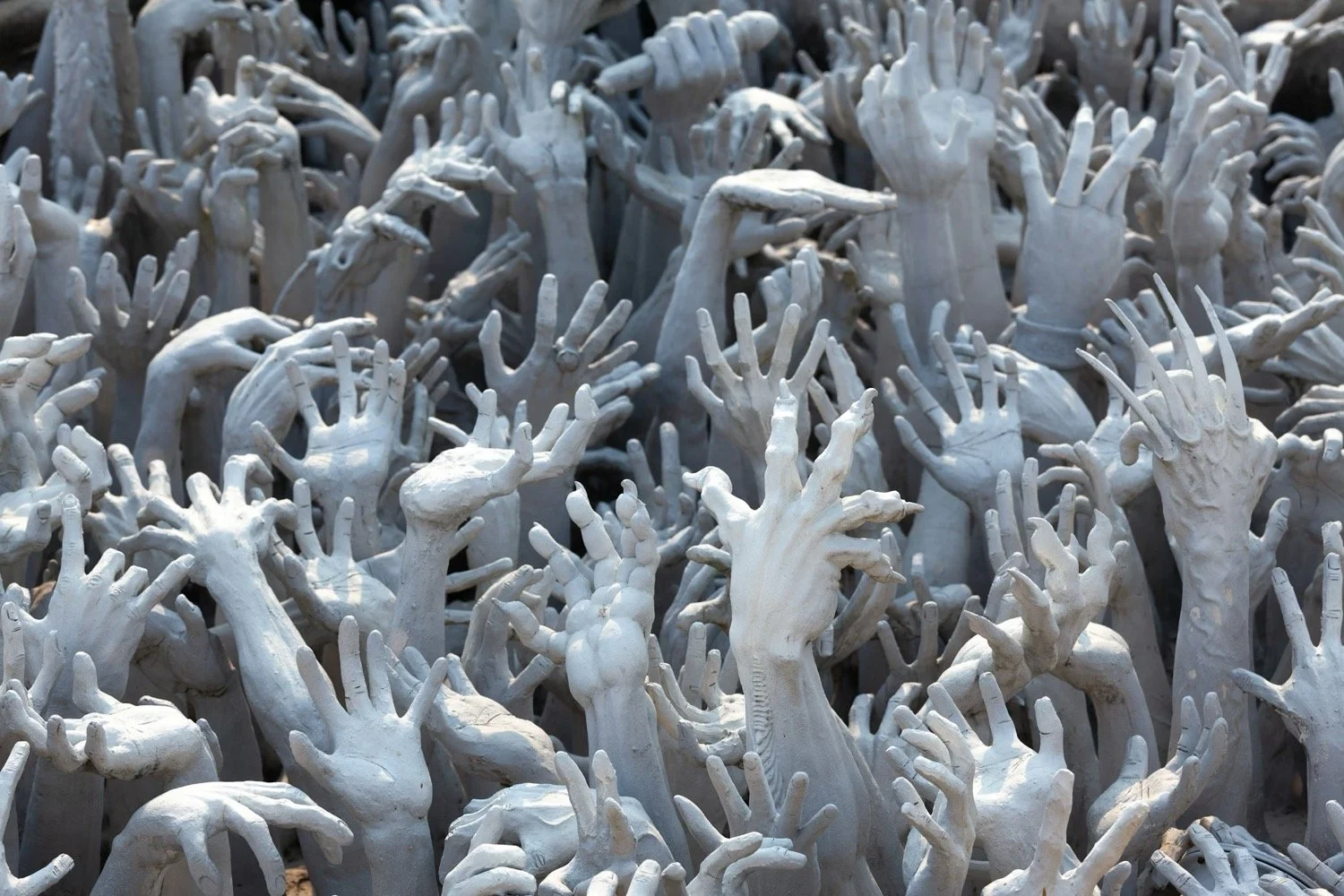Readings for today: Job 6-9
I’m reading the Message version of the Bible this year and love how author, Eugene Peterson, translates the ancient meaning of the text into 21st century American vernacular. Take the gut-wrenching questions of Job as an example. “Why didn’t I die at birth, my first breath out of the womb my last?” (Job 5:11) “Why does God bother giving light to the miserable, why bother keeping bitter people alive, those who want in the worst way to die, and can’t, who can’t imagine anything better than death, who count the day of their death and burial the happiest day of their life? What’s the point of life when it doesn’t make sense, when God blocks all the roads to meaning?” (Job 5:20-23) “Human life is a struggle, isn’t it? It’s a life sentence to hard labor.” (Job 7:1) After experiencing so much misery and tragedy and pain, Job finally reaches the point of utter despair. His friends are at a loss. They don’t know how to help. They are afraid for their friend. As they sit with their friend in the ashes of his life, an anxiousness begins to grow within them. Every word Job speaks only increases their anxiety and fear. Their feelings of helplessness. Their feelings of hopelessness. Finally, they can’t take it anymore and they begin to respond.
How do I know this is what Job’s friends are experiencing? Because it’s what I experience every time I walk into a similar situation with people I love who have experienced suffering. I have been in the emergency rooms with parents as they said goodbye to their children. I have been in the neonatal units watching infants struggle for every breath. I have sat at the bedside of those dying from cancer and tried to bring comfort to their loved ones. I have been in the developing world and seen life-threatening poverty. I have prayed over men and women whose condition is utterly hopeless because they simply do not have access to the resources they need to survive. In EVERY single case, I feel helpless, inadequate, afraid, frustrated, and I despair. These feelings threaten to overwhelm me and, if I am not careful, can cause me to say things more for my own benefit than for the good of others. This is what we see play out in Job’s conversations with his friends. They are experiencing all kinds of emotions as well as they sit with Job and eventually reach a breaking point where they feel they have to respond. Not for Job’s sake but for their own.
Eliphaz is the first to speak. “You’ve been hit hard and you’re reeling from the blow. But shouldn’t your devout life give you confidence now? Shouldn’t your exemplary life give you hope? Think! Has a truly innocent person ever ended up on the scrap heap? Do genuinely upright people ever lose out in the end?” (4:6-7) Now this is a theologically true statement. The fear of God is our confidence. Walking in integrity with God is our hope. God promises to protect the innocent and the upright. These things are all true. At the same time, speaking these words to a man who has lost all he holds dear and who, even now, suffers from sores and wounds that are infected with worms is insensitive and superficial at best. What Job needs is not an answer to why he is suffering but friends who will simply sit and listen and let him process his pain for however long it takes. Yes, it is true that “mortals are born and bred for trouble, as certainly as sparks fly upward.” (5:7) But for Eliphaz to suggest to Job that if he were in Job’s shoes, he’d “go straight to God, I’d throw myself on the mercy of God. After all, he’s famous for great and unexpected acts; there’s no end to his surprises….” (5:8-9) is patently absurd. Eliphaz simply has no idea how he would respond were he in Job’s situation and that’s why his words fall on deaf ears.
Job responds with a stinging rebuke. “When desperate people give up on God Almighty, their friends, at least, should stick with them. But my brothers are fickle…They arrive so confident - but what a disappointment! They get there, and their faces fall! And you, my so-called friends, are no better - there’s nothing to you!” (6:14-15, 20-21) He clearly sees their fear. He clearly sees their discomfort. He clearly sees their anxiety as they sit helpless before him. He knows they are struggling with how to respond. But he also knows Eliphaz’s answer is far too simplistic. Suffering and sin do not exist in a one to one relationship. This situation has nothing to do with cause and effect. Eliphaz’s theology is far too superficial to explain why some people suffer in extraordinary ways when they have not extraordinarily sinned. Nor is it adequate to explain why some people prosper in extraordinary ways when they clearly are extraordinary sinners! So Job rejects what Eliphaz has to say.
Once again, Job cries out to God. “What are mortals anyway, that you bother with them, that you even give them the time of day? That you check up on them every morning, looking in on them to see how they’re doing? Let up on me, will you? Can’t you even let me spit in peace? Even suppose I’d sinned—how would that hurt you? You’re responsible for every human being. Don’t you have better things to do than pick on me? Why make a federal case out of me? Why don’t you just forgive my sins and start me off with a clean slate? The way things are going, I’ll soon be dead. You’ll look high and low, but I won’t be around." (Job 7:17-21) This is raw. This is real. This is the kind of honest emotion God welcomes from His children. God’s a big boy. We aren’t going to offend Him with our words. He can handle all we throw at Him. And Job’s words here in this passage invite us to share our deepest, most intimate thoughts and feelings with God.
But such raw emotion is too much for Bildad. He feels he has to rush to God’s defense. (As if God ever needs us to defend Him.) “Does God mess up? Does God Almighty ever get things backward? It’s plain that your children sinned against him— otherwise, why would God have punished them? Here’s what you must do—and don’t put it off any longer: Get down on your knees before God Almighty. If you’re as innocent and upright as you say, it’s not too late—he’ll come running; he’ll set everything right again, reestablish your fortunes.” (Job 8:3-6) Brutal. Harsh. Unloving. Uncaring. Your children died because they sinned? Chalk that one up to “things never to say to people who are in pain!” But Bildad goes even further, insisting Job has clearly sinned and therefore deserves what he has received. If only Job will seek God - as if Job hasn’t - then he will be healed and restored.
But Job clings to his faith. He continues to acknowledge the sovereignty of God. “So what’s new? I know all this. The question is, ‘How can mere mortals get right with God?’ If we wanted to bring our case before him, what chance would we have? Not one in a thousand! God’s wisdom is so deep, God’s power so immense, who could take him on and come out in one piece? He moves mountains before they know what’s happened, flips them on their heads on a whim. He gives the earth a good shaking up, rocks it down to its very foundations. He tells the sun, ‘Don’t shine,’ and it doesn’t; he pulls the blinds on the stars. All by himself he stretches out the heavens and strides on the waves of the sea…So how could I ever argue with him, construct a defense that would influence God?” (Job 9:2-8, 14) Though Job is not “guilty as charged”, he understands his position before God. This really isn’t about guilt or innocence because again, suffering and sin do not exist in a one to one relationship. This is about Job’s pain not his purity. This is about Job’s suffering not his sanctity. This is about Job’s heartbreak not his holiness. He is hurting and out of his hurt, he cries out to God.
Where are you hurting today? What heartbreaks have you experienced in your life? Where have you found yourself crying out to God? Know He hears every word. He listens to every prayer. Where have you been like Job’s friends? Struggling to find the right words to say when all you want to do is escape the situation? Have you ever said things more to ease your own conscience than to help the one in need? Learn to listen more deeply and be willing to sit in silence in the dust and ashes with those you love who are hurting and you will find yourself a much better counselor than Job’s friends.
Readings for tomorrow: Job 10-13




